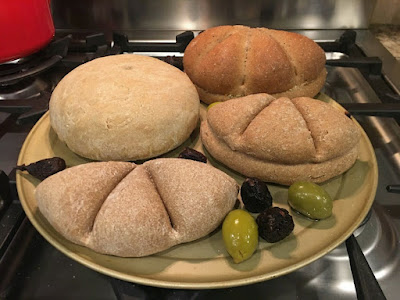Nox est et noctū agricolae agrōs nōn cūrant.
Noctū mātrēs cēnam nōn parant.
Noctū discipulī dēfessī in scholā nōn labōrant et
linguam Latīnam nōn discunt. Sed
noctū nautae saepe labōrant.
Nox est et ibi medicus ambulat.
Medicus noster nōn est, sed medicus puerī. Nunc medicus properat sed est tardus. In silvā properat. Puer, fīlius agricolae, in casā est
aeger. Medicus, vir clārus et benignus, ad casam agricolae properat quod puer est aeger. Nox est et
medicus sōlus ambulat. Amīcī cum
medicō nōn ambulant. Sōlus properat. Tardus est quod lūna est obscūra.
Medicus lūnam clāram vidēre cupit. Stellae quoque sunt obscūrae et medicus
nōn clārē videt. Puer laetus nōn
est. Aeger et miser est. Ubi nōs aegrī sumus, miserī sumus nōs quoque. Puer
sōlus est, sed sōlus esse nōn cupit.
Amīcōs bonōs vidēre cupit. Lūnam et stellās nōn videt quod obscūrae sunt. Puer aeger
medicum benignum exspectat sed
medicus est tardus.
Nunc medicus iānuam agricolae aperit et
puerum aegrum spectat. Medicus
est puerō benignus. Puerō fābulās longās et bonās nārrat. Ex fenestrīs puer et medicus
silvam spectant sed stellās
et lūnam nōn vident. Nunc
medicus iānuam claudit. Ex casā
agricolae properat et ad
silvam ambulat.
____________________
ambulō, ambulāre [1]: walk
cūrō, cūrāre [1]: look after; take care of
exspectō, exspectāre [1]: wait for
nārrō, nārrāre [1]: narrate; tell (e.g. a
story)
parō, parāre [1]: prepare
properō, properāre [1]: hurry
spectō, spectāre [1]: look at; watch
____________________
videō, vidēre [2]: see
____________________
claudō, claudere [3]: close
discō, discere [3]: learn
____________________
cupiō, cupere [3-iō]: desire; want
____________________
aperiō, aperīre [4]: open
Links to all posts on the present tense of the four
conjugations and the imperative forms of the verb
[1] 1st conjugation
25.02.24: verbs; first conjugation present tense
https://adckl.blogspot.com/2024/04/verbs-first-conjugation-present-tense.html
25.02.24: ways of learning; derivatives and detective work!
https://adckl.blogspot.com/2024/04/ways-of-learning-derivatives-and.html
25.02.04: verb translation [1]
https://adckl.blogspot.com/2024/04/look-at-images-and-translate-these.html
25.02.24: verb translation [2]
https://adckl.blogspot.com/2024/04/look-at-images-and-translate-phrases.html
[2] 2nd conjugation
01.03.24: 2nd conjugation verbs
https://adckl.blogspot.com/2024/04/010324-2nd-conjugation-verbs.html
01.03.24: 2nd conjugation verbs; present tense
https://adckl.blogspot.com/2024/04/010324-2nd-conjugation-verbs-present.html
01.03.24: second conjugation
https://adckl.blogspot.com/2024/04/010324-second-conjugation.html
01.03.24: Some simple practice with 2nd conjugation verbs.
https://adckl.blogspot.com/2024/04/010324-some-simple-practice-with-2nd.html
[3] 3rd conjugation
11.03.24: introduction to 3rd conjugation verbs ... and how to be a worthless dice player!
https://adckl.blogspot.com/2024/04/110324-introduction-to-3rd-conjugation.html
11.03.24: 3rd conjugation verbs: ways of learning
https://adckl.blogspot.com/2024/04/110324-3rd-conjugation-verbs-ways-of.html
11.03.24: simple practice for the 3rd conjugation
https://adckl.blogspot.com/2024/04/110324-simple-practice-for-3rd.html
[4] Principal parts of verbs
13.03.24: Daily routine [1]; the principal parts of verbs
https://adckl.blogspot.com/2024/04/130324-daily-routine-1-principal-parts.html
13.03.24: principal parts of verbs
https://adckl.blogspot.com/2024/04/130324-principal-parts-of-verbs.html
[5] 4th conjugation
17.03.24: 4th conjugation; reading
https://adckl.blogspot.com/2024/04/170324-4th-conjugation-reading.html
17.03.24: examples of fourth conjugation verbs
https://adckl.blogspot.com/2024/04/170324-examples-of-fourth-conjugation.html
17.03.24: practice in the 4th conjugation
https://adckl.blogspot.com/2024/04/170324-practice-in-4th-conjugation.html
[6] 3rd-iō conjugation
18.03.04: 3rd-iō conjugation
https://adckl.blogspot.com/2024/04/180304-3rd-io-conjugation.html
18.03.24: practice in the 3-iō conjugation
https://adckl.blogspot.com/2024/04/180324-practice-in-3-io-conjugation.html
[7] imperative
22.03.24: imperatives [1]: telling people to do something
https://adckl.blogspot.com/2024/04/220324-imperatives-1-telling-people-to.html
22.03.24: imperatives [2]; telling people not to do something
https://adckl.blogspot.com/2024/04/220324-imperatives-2-telling-people-not.html
23.03.24: video; imperatives
https://adckl.blogspot.com/2024/04/230324-video-imperatives.html














.jpg)























